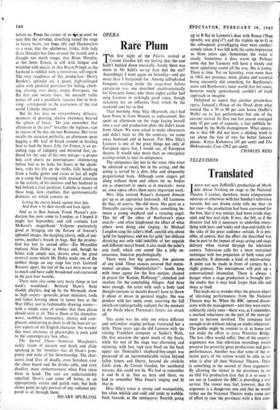Rare Plum
OPERA
Mile first night of the Fidelio revival at I Covent Garden left me feeling that the cast hadn't bedded down musically. Surely there was more in Mr Solti's set-up than met the ear? Accordingly I went again on Saturday—and got more, than I bargained for. Among cellophaned bouquets waiting inside the stage-door before curtain-up was one inscribed anachronistically for Gwyneth Jones, who three nights earlier had sung Leonore in strikingly good voice, though sickening for an influenza bout which by the weekend sent her to bed.
That morning Anja Silja (Bayreuth, etc.) had been flown in from Munich as replacement. She spent an afternoon on the stage keying herself into a cast and production plots she didn't know from Adam. We were asked to make allowances and didn't have to. On the contrary, we came away bemused and in heaven. For Miss Silja's Leonore is one of the great things not only of European opera but, I would say, of European theatre. It would take more than an emergency casting-switch to mar its uniqueness.
The uniqueness lies not in the voice (this must be admitted at once), but in the acting; and the acting is served by a slim, lithe and eloquently proportioned body. Although some singers get along without them and others try to, bodies are as important in opera as in musicals : more so, since opera offers them more important work.
Miss Silja entered Rocco's dungeon domain got up as an apprentice locksmith. All Leonores do that, of course. She did more. She gave us a Donatello carving come to flesh, something be- tween a young shepherd and a rescuing angel. This hit off the ethos of Beethoven's piece exactly—and often heightened the effect of what others were doing and singing. As Michael Langdon sang the jailer's bluff, squalid aria about `gold for happiness, and me for gold,' her delicate shrinking not only told indelibly of her anguish and different moral breed; it also made the jailer's aria itself, which can sound like a jolly ex- crescence, function psychologically.
There were few big gestures; few gestures of any kind. Three stances covered that monu- mental set-piece 'Abscheulicher ': hands limp with inner agony for the first section; clasped in prayer for `Komm, Hoffnung!'; clenched and resolute for the concluding Allegro. And three were enough. An artist with such a body (and thought-tensions to match) doesn't have to throw it about or invest in gestural niggles. She was prudent with her smile, even, reserving the full switch-on (unforgettably radiant) for the moment in the finale where Florestan's fetters are struck off.
This scene was the only one where different and unfamiliar staging perhaps frustrated her a little. Three years ago she did Leonore with the visiting Frankfurt company at Sadler's Wells. On that occasion she spent much of the finale, while the rest of the stage was chorusing and rejoicing, with lost, rapt eyes fixed on the back upper tier. Donatello's shepherd-boy-angel was possessed of an incommunicable vision beyond fallen fetters and liberty, beyond die eheliche Liebe even. At Covent Garden, for accidental reasons, this could not be. We had to remember it and fit it in. Just as, here and there, we had to remember Miss Jones's singing and fit that in.
Miss Silja's voice is strong and manipulable, but often whitish and cold and tends to wobble. Such hazards as the semiquaver flourish going
up to B flat in Leonore's duet with Rocco (`Nun siirecht, wie ging's?') and the triplets up to G in the subsequent gravedigging duet were cumber- somely taken. I was left with the same impression as three years ago. Sometimes the voice is steady. Sometimes it does warm up. Perhaps some day her Leonore will have a steady and more appetising sound all the way. She is young. There is time. Yet on Saturday, even more than in 1963, her presence, mien, glance and essential being uncannily did something for Beethoven's score and Beethoven's inner world that bel canto, however nicely spokeshaved, couldn't of itself approach or imagine.
Delighted to report that another prison-bars opera, Janacek's House of the Dead, drew what looked like a 70 to 80 per cent house (Sadler's Wells) on its last performance but one of the current revival. Its first run last season averaged only 42 per cent of capacity, a fact publicly be- moaned by the Wells management. What annoys me is that SW did not have a chiding word to say about the fate of two far better Janacek pieces : Katya Kabanova (45 per cent) and The Makropoules Case (39.2 per cent).
CHARLES REID


































 Previous page
Previous page